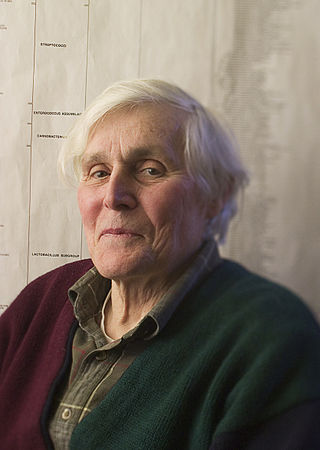
Carl Woese was an American microbiologist and biophysicist. Woese is famous for defining the Archaea in 1977 through a pioneering phylogenetic taxonomy of 16S ribosomal RNA, a technique that has revolutionized microbiology. He also originated the RNA world hypothesis in 1967, although not by that name. Woese held the Stanley O. Ikenberry Chair and was professor of microbiology at the University of Illinois Urbana–Champaign.

Cold Spring Harbor Laboratory (CSHL) is a private, non-profit institution with research programs focusing on cancer, neuroscience, plant biology, genomics, and quantitative biology. It is located in Laurel Hollow on Long Island, New York.
Tom Maniatis, is an American professor of molecular and cellular biology. He is a professor at Columbia University, and serves as the Scientific Director and CEO of the New York Genome Center.

The Max Planck Institute for Biophysical Chemistry, also known as the Karl-Friedrich Bonhoeffer Institute, was a research institute of the Max Planck Society, located in Göttingen, Germany. On January 1, 2022, the institute merged with the Max Planck Institute for Experimental Medicine in Göttingen to form the Max Planck Institute for Multidisciplinary Sciences.

The Eli and Edythe L. Broad Institute of MIT and Harvard, often referred to as the Broad Institute, is a biomedical and genomic research center located in Cambridge, Massachusetts, United States. The institute is independently governed and supported as a 501(c)(3) nonprofit research organization under the name Broad Institute Inc., and it partners with the Massachusetts Institute of Technology, Harvard University, and the five Harvard teaching hospitals.
Vladimir Aleksandrovich Engelgardt was a Soviet biochemist, academician of the Soviet Academy of Medical Sciences (1944), academician of the Soviet Academy of Sciences (1953), and Hero of Socialist Labor (1969). He was the founder and the first director of the Institute of Molecular Biology of the Russian Academy of Sciences.

The Max Planck Institute of Immunobiology and Epigenetics in Freiburg, Germany is an interdisciplinary research institute that conducts basic research in modern immunobiology, developmental biology and epigenetics. It was founded in 1961 as the Max Planck Institute of Immunobiology and is one of 86 institutions of the Max Planck Society. Originally named the Max Planck Institute of Immunobiology, it was renamed to its current name in 2010 as it widened its research thrusts to the study of epigenetics.

The College of Biological Sciences (CBS) is one of seven freshman-admitting colleges at the University of Minnesota. Established in 1869 as the College of Science, the College of Biological Science is now located across both the Minneapolis and the St. Paul campuses. As of June 29, 2023, the dean of the College of Biological Sciences is Dr. Saara J DeWalt.
Evolution of cells refers to the evolutionary origin and subsequent evolutionary development of cells. Cells first emerged at least 3.8 billion years ago approximately 750 million years after Earth was formed.
Utpal Banerjee is a distinguished professor of the department of molecular, cell and developmental biology at UCLA. He obtained his Bachelor of Science degree in chemistry from St. Stephen's College, Delhi University, India and obtained his Master of Science degree in physical chemistry from the Indian Institute of Technology, Kanpur, India. In 1984, he obtained a PhD in chemistry from the California Institute of Technology where he was also a postdoctoral Fellow in the laboratory of Seymour Benzer from 1984-1988.
The NAS Award in Molecular Biology is awarded by the U.S. National Academy of Sciences "for recent notable discovery in molecular biology by a young scientist who is a citizen of the United States." It has been awarded annually since its inception in 1962.

The House of Engelhardt is a Baltic-German noble and baronial family of the former Russian Empire. The family name is sometimes given as von Engelhardt.

Mohan Rao Chintalagiri is an Indian molecular biologist renowned for his contributions to the fields of biophysics and molecular biology. He has earned international recognition for his work on molecular chaperones as well as his contribution to the field of photoacoustic spectroscopy in health and disease. He is a former Director of the Centre for Cellular and Molecular Biology (CCMB) and served as a CSIR-Distinguished Scientist. He received the Shanti Swarup Bhatnagar Prize in 1999, the highest science honor in India.

Nicholas José Talbot FRS FRSB is Group Leader and Executive Director at The Sainsbury Laboratory in Norwich.
Pamela Soltis is an American botanist. She is a distinguished professor at the University of Florida, curator at the Florida Museum of Natural History, principal investigator of the Laboratory of Molecular Systematics and Evolutionary Genetics at the Florida Museum of Natural History, and founding director of the University of Florida Biodiversity Institute.
Asis Datta is an Indian biochemist, molecular biologist and genetic engineer, known for his research on genetically modified foods and food nutritional security. He was the founding Director of the National Institute of Plant Genome Research and is credited with the discovery of genes that assist in extended preservation of fruits and vegetables. He is a recipient of the Shanti Swarup Bhatnagar Award, the highest Indian award and in the Science category, and was awarded the fourth highest civilian award of the Padma Shri, by the Government of India, in 1999. In 2008, he was included again in the Republic Day Honours list for the third highest civilian honour of the Padma Bhushan.
Stanislas Leibler is a French-American theoretical and experimental biologist and physicist. He is Systems Biology Professor at the Institute for Advanced Study in Princeton and the Gladys T. Perkin Professor and Head of the Laboratory of Living Matter at the Rockefeller University.
Dr. John Engelhardt is the director at the University of Iowa Center for Gene Therapy of Cystic Fibrosis, as well as the head of the department of anatomy and cell biology. He is a well known scientist and inventor who created the first cloned ferret and has made huge strides in finding the cure for cystic fibrosis.

Genome Informatics is a scientific study of information processing in genomes.
Nagima Abenovna Aitkhozhina was a Kazakh biologist who specialised in the field of molecular biology. She was engaged in the study of the structural and functional organisation of the genome of higher organisms and the molecular mechanisms of regulation of its expression. Aitkhozhina served as general director of the Institute of Molecular Biology and Biochemistry named after M.A. Aitkhozhin of the National Academy of Sciences of the Republic of Kazakhstan from 1990 to 2018, Kazakhstan's first genome laboratory. Between 1999 and 2002, she was president of the Kazakhstan Academy of Sciences. Aitkhozhina was an elected deputy of the Congress of People's Deputies of the Soviet Union from the Committee of Soviet Women from 1989 to 1991. She was decorated with the Order of Parasat in December 2001 and the Order of the Leopard, Third Class ten years later.









